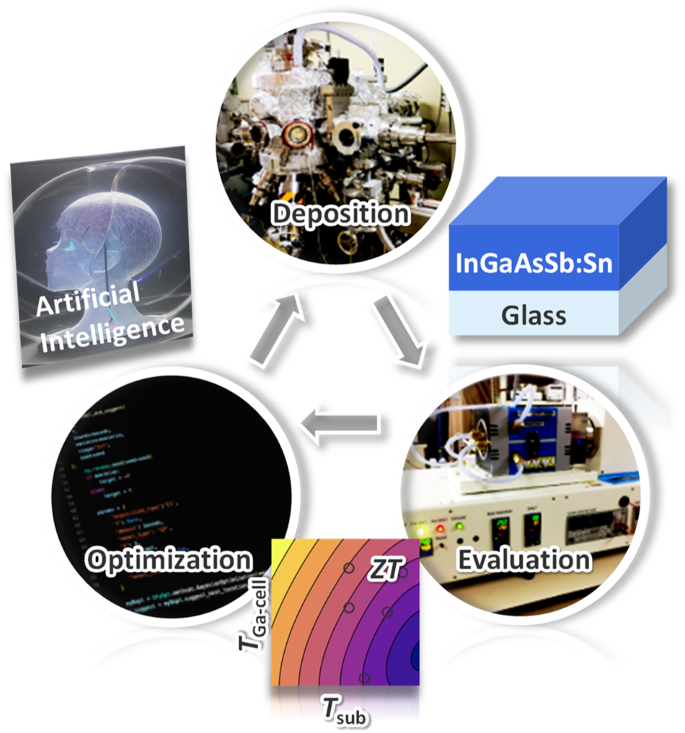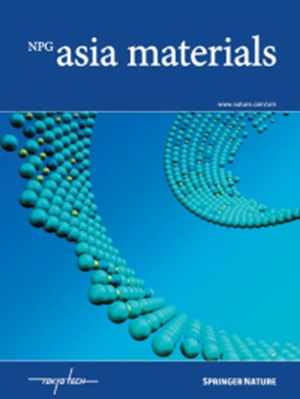Bayesian optimization-driven enhancement of the thermoelectric properties of polycrystalline III-V semiconductor thin films
IF 8.3
2区 材料科学
Q1 MATERIALS SCIENCE, MULTIDISCIPLINARY
引用次数: 0
Abstract
Studying the properties of thermoelectric materials needs substantial effort owing to the interplay of the trade-off relationships among the influential parameters. In view of this issue, artificial intelligence has recently been used to investigate and optimize thermoelectric materials. Here, we used Bayesian optimization to improve the thermoelectric properties of multicomponent III–V materials; this domain warrants comprehensive investigation due to the need to simultaneously control multiple parameters. We designated the figure of merit ZT as the objective function to improve and search for a five-dimensional space comprising the composition of InGaAsSb thin films, dopant concentration, and film-deposition temperatures. After six Bayesian optimization cycles, ZT exhibited an approximately threefold improvement compared to its values obtained in the random initial experimental trials. Additional analysis employing Gaussian process regression elucidated that a high In composition and low substrate temperature were particularly effective at increasing ZT. The optimal substrate temperature (205 °C) demonstrated the potential for depositing InGaAsSb thermoelectric thin films onto plastic substrates. These findings not only promote the development of thermoelectric devices based on III–V semiconductors but also highlight the effectiveness of using Bayesian optimization for multicomponent materials. Bayesian optimization improved the thermoelectric properties of InGaAsSb thin films; this domain warrants comprehensive investigation due to the need to simultaneously control multiple parameters, such as, the composition, dopant concentration, and film-deposition temperatures. After six optimization cycles, the dimensionless figure of merit exhibited an approximately threefold improvement compared to its values obtained in the random initial experimental trials. These findings not only promote the development of thermoelectric devices based on III–V semiconductors but also highlight the effectiveness of using Bayesian optimization for multicomponent materials.


贝叶斯优化驱动的多晶 III-V 族半导体薄膜热电性能增强技术
由于各影响参数之间存在相互影响的权衡关系,因此研究热电材料的特性需要投入大量精力。有鉴于此,人工智能最近被用于研究和优化热电材料。在此,我们使用贝叶斯优化法来改善多组分 III-V 材料的热电特性;由于需要同时控制多个参数,这一领域值得全面研究。我们将功勋值 ZT 指定为需要改进的目标函数,并搜索由 InGaAsSb 薄膜成分、掺杂浓度和薄膜沉积温度组成的五维空间。经过六个贝叶斯优化周期后,ZT 与随机初始实验试验中获得的值相比提高了约三倍。利用高斯过程回归进行的其他分析表明,高 In 成分和低衬底温度对提高 ZT 特别有效。最佳衬底温度(205 °C)证明了在塑料衬底上沉积 InGaAsSb 热电薄膜的潜力。这些发现不仅促进了基于 III-V 族半导体的热电设备的开发,而且凸显了使用贝叶斯优化技术对多组分材料进行优化的有效性。
本文章由计算机程序翻译,如有差异,请以英文原文为准。
求助全文
约1分钟内获得全文
求助全文
来源期刊

Npg Asia Materials
MATERIALS SCIENCE, MULTIDISCIPLINARY-
CiteScore
15.40
自引率
1.00%
发文量
87
审稿时长
2 months
期刊介绍:
NPG Asia Materials is an open access, international journal that publishes peer-reviewed review and primary research articles in the field of materials sciences. The journal has a global outlook and reach, with a base in the Asia-Pacific region to reflect the significant and growing output of materials research from this area. The target audience for NPG Asia Materials is scientists and researchers involved in materials research, covering a wide range of disciplines including physical and chemical sciences, biotechnology, and nanotechnology. The journal particularly welcomes high-quality articles from rapidly advancing areas that bridge the gap between materials science and engineering, as well as the classical disciplines of physics, chemistry, and biology. NPG Asia Materials is abstracted/indexed in Journal Citation Reports/Science Edition Web of Knowledge, Google Scholar, Chemical Abstract Services, Scopus, Ulrichsweb (ProQuest), and Scirus.
 求助内容:
求助内容: 应助结果提醒方式:
应助结果提醒方式:


